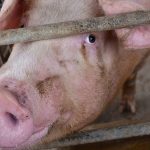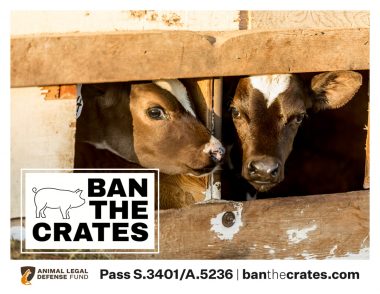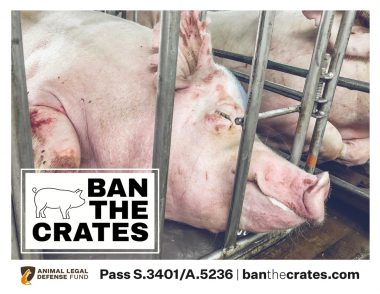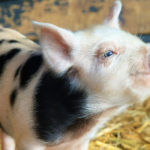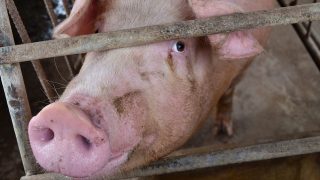
Gestation and Veal Crate Ban (New Jersey)
A.1970/S.1298
Would ban gestation crates and veal crates, mandating mother pigs and calves have enough space to turn around freely, lie down, stand up, and fully extend their limbs.
Status
In coalition with animal protection groups, the Animal Legal Defense Fund is working to end the intensive confinement of mother pigs and calves used for veal in New Jersey. A.1970/S.1298, sponsored by Senator Vin Gopal (D-11) and Assemblyman Raj Mukherj (D-33), would ban gestation crates and veal crates, mandating mother pigs and calves have enough space to turn around freely, lie down, stand up, and fully extend their limbs.
Both gestation crates and veal crates are extremely cruel. Gestation crates are metal cages that confine mother pigs for virtually their entire lives. These crates are so small that animals are unable to even turn around. Veal crates are small, individual cages used to confine newborn calves prior to slaughter. The crates essentially immobilize these playful, energetic creatures, preventing them from engaging in almost any natural behavior and social interaction.
Past bills to outlaw gestation crates passed the New Jersey legislature with overwhelming bipartisan support. Polls indicate 93% of New Jersey voters support a ban on the extreme confinement of mother pigs.
New Jersey: End the Cruel Confinement of Mother Pigs and Calves Used for Veal
Please help end the intensive confinement of mother pigs and calves used for veal in New Jersey by asking Gov. Murphy to sign A.1970.
The COVID-19 pandemic and the connection between animal exploitation and zoonotic disease has further underscored the urgent need for this law. A landmark United Nations report on pandemic risks noted that the extreme confinement of farmed animals is one of the top drivers of zoonotic disease emergence. Banning gestation and veal crates not only reduces animal suffering but also protects public health.
“Gestation crates are a real problem. Basically, you’re asking a sow to live in an airline seat. . . We’ve got to treat animals right, and gestation stalls have got to go.”
Get Involved
Spread the word about this campaign by taking a photo of your companion animals with one of our #BanTheCratesNJ signs and sharing it on social media.
Follow these steps to participate:
- Print one or both of our signs urging New Jersey to ban gestation crates and veal crates.
- Take a photo of your companion animal with the sign or take a photo of yourself holding the sign and post it on Twitter, Facebook, or Instagram using the hashtag #BanTheCratesNJ. If you live in New Jersey, be sure to include a link to our action alert so residents can urge their legislators to support A.1970/S.1298.
- The Animal Legal Defense Fund will be sharing and retweeting some of the photos!
- If you need some inspiration, you can use the sample posts below:
-
- For New Jersey residents: It’s time for New Jersey to ban the crates! Ask your state legislators to support A.1970/S.1298 and ban cruel gestation/veal crates at aldf.org/NJCrate. #BanTheCratesNJ
- Non-New Jersey residents: It’s time for New Jersey to ban cruel gestation crates and veal crates! Help end the intensive confinement of mother pigs and calves used for veal. Learn how: https://aldf.org/project/gestation-and-veal-crate-ban-new-jersey/ #BanTheCratesNJ
Fast Facts
Gestation Crates
Due to the duration and severity of their confinement, pigs in gestation crates suffer among the worst abuses in factory farming. For several years, mother pigs are nearly immobilized, enduring a cycle of repeated impregnation.
- Gestation crates are approximately 2 feet wide and 7 feet long, so small the animals can’t even turn around or take more than a step forward or backward.
- Pigs are active, social, curious animals. Denied any mental stimulation or enrichment, they suffer psychologically. Many become neurotic and engage in repetitive coping behaviors such as biting the metal bars in front of them.
- Unable to move freely, pigs suffer muscle and bone damage that often leads to debilitating injuries.
- Confined pigs suffer from a high rate of urinary tract infections (UTIs) due to their inactivity, decreased water consumption, and infrequency of urination. UTIs are a significant cause of death in pigs held in gestation crates.
Veal crates
Despite the intense bond between cows and their babies, calves raised for veal are taken away from their mothers within days or even hours of birth. These calves are placed in veal crates that immobilize them.
- Calves are isolated in narrow wooden stalls or pens, severely restricting their movement.
- Cows are ruminants, digesting their food in two stages by chewing and swallowing, then regurgitating, and chewing again. But calves used for veal are fed an all-liquid diet that is low in iron in order to induce anemia and make their flesh paler — producing “white meat.” This disrupts the physiological development of their stomach and their ability to absorb nutrients.
- Denied any social enrichment, physical and mental stimulation, or a relationship with their mother, stressed calves routinely engage in stereotypic behavior.
- In 2007, the Board of Directors of the American Veal Association adopted a resolution calling for U.S. producers to transition away from crates to group housing methods by 2017.
Corporate and Legislative Progress
- Ten states (Arizona, California, Colorado, Florida, Maine, Massachusetts, Michigan, Ohio, Oregon, Rhode Island), Canada, and the E.U. have already banned gestation crates.
- Nine states (Arizona, California, Colorado, Kentucky, Maine, Massachusetts, Michigan, Ohio, Rhode Island) have banned veal crates.
- Corporations are increasingly moving away from the use of crates in their supply chain. McDonald’s, Burger King, Wendy’s, Carl’s Jr., Tim Hortons, Sonic, Kroger, Kraft Foods, and Safeway are just some of the companies that prohibit crates.
Learn more about farmed animals and the law.
Sign Up!
Join the Animal Legal Defense Fund's email list to stay up to date on lawsuits, legislation, and regulations affecting animals.


